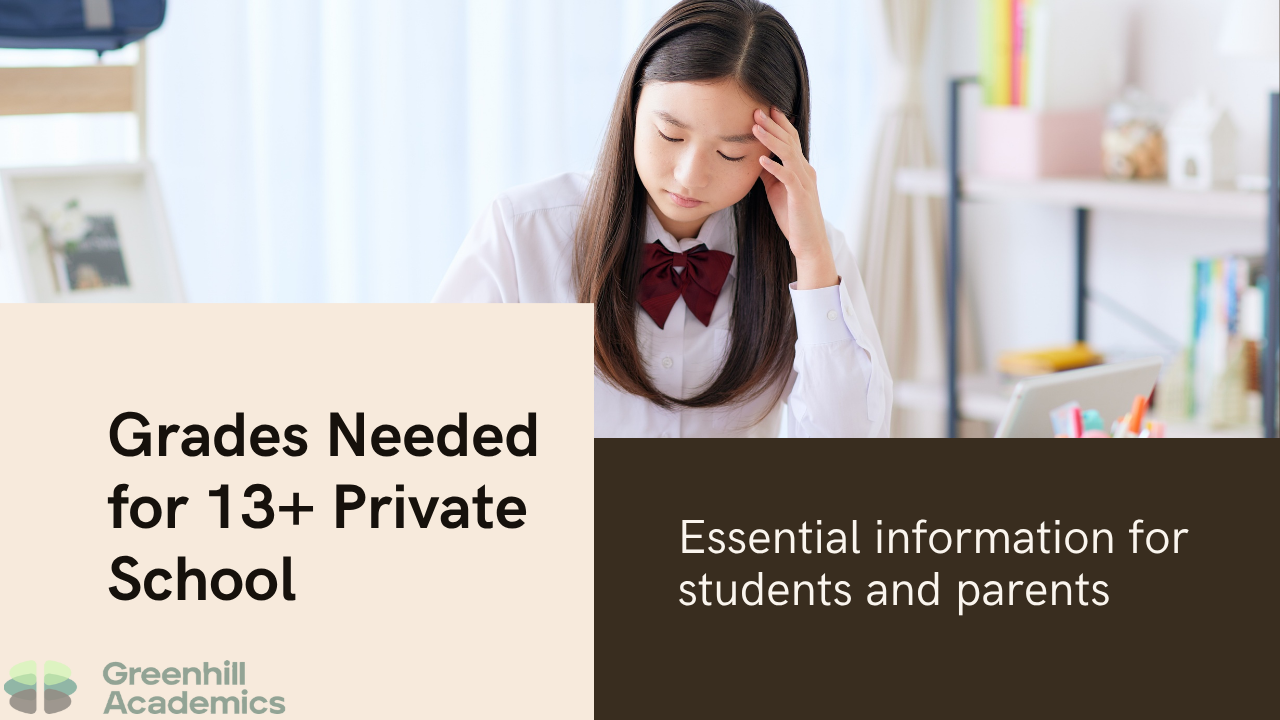13+ entry to prestigious private schools represents one of the most competitive educational pathways in the UK. Unlike 11+ entry which focuses primarily on entrance tests, 13+ applications require a careful balance of academic grades, entrance exam performance, and school assessments that many families find overwhelming to navigate.
This guide reveals the grade requirements and application strategies that consistently help families secure places at leading independent schools.
Understanding 13+ Entry Requirements
13+ entry differs significantly from other school transitions because it occurs after two years of secondary education, giving schools substantial academic data to evaluate alongside entrance assessments.
Key Components of 13+ Applications
Current School Reports: Year 7 and Year 8 academic performance across all subjects
Entrance Examinations: School-specific tests in core subjects
Common Entrance: Standardised examinations taken by many applicants
Interviews: Academic discussions and personal suitability assessment
References: Detailed reports from current schools about academic and personal development
Grade Requirements by School Tier
Top Tier Schools (Eton, Harrow, Winchester, Westminster):
- Predominantly A*/A grades across all subjects
- Exceptional performance in entrance examinations
- Outstanding personal qualities and leadership potential
Highly Selective Schools (Marlborough, Charterhouse, Rugby, Sherborne):
- Strong A/B grades with some A* performance
- Above-average entrance exam results
- Clear evidence of academic engagement and personal development
Selective Independent Schools:
- B/C grades with evidence of improvement trajectory
- Solid entrance exam performance
- Demonstration of potential and motivation
Subject-Specific Grade Expectations
Core Academic Subjects
English Language and Literature:
- Top schools expect A*/A grades demonstrating sophisticated analytical thinking
- Strong performance in creative writing and comprehension
- Evidence of wide reading beyond curriculum requirements
Mathematics:
- Consistent A*/A performance with clear problem-solving ability
- Confidence with abstract concepts and mathematical reasoning
- Strong foundation for GCSE-level work
Sciences (Biology, Chemistry, Physics):
- A/B grades showing understanding of scientific principles
- Practical work competence and scientific reasoning
- Curiosity about natural phenomena and scientific processes
Modern Foreign Languages
Expectations Vary by School Focus:
- Traditional schools often require Latin alongside modern languages
- Strong oral and written communication in chosen languages
- Cultural awareness and linguistic curiosity
Humanities and Creative Subjects
History and Geography:
- Evidence of analytical thinking and essay-writing skills
- Understanding of causation, change, and continuity
- Ability to evaluate sources and construct arguments
Art, Music, Drama:
- Creative talent and technical competence
- Commitment to artistic development
- Potential for contribution to school cultural life
Grade Trajectories and Academic Progress
What Schools Really Value
Private schools understand that Year 7 and 8 represent significant developmental periods where academic performance can vary considerably. They focus on trends and potential rather than isolated grades.
Upward Trajectory: Consistent improvement across subjects demonstrates motivation and adaptability Academic Resilience: Recovery from temporary setbacks shows character and determination
Subject Passion: Exceptional performance in specific areas can compensate for weaker performance elsewhere
Understanding Grade Contexts
School Setting: Independent prep schools often have higher grade distributions than state schools Teaching Standards: Schools evaluate grades relative to the teaching quality and academic standards of your current school
Peer Comparison: Performance relative to classmates provides important context for absolute grades
Entrance Examination Performance
Common Entrance Requirements
Many independent schools require Common Entrance examinations alongside school grades, creating a dual assessment system.
Grade Boundaries: Typically 60-70% for competitive schools, 70%+ for the most selective
Subject Coverage: English, Mathematics, Science, and often Latin, French, Geography, History
Preparation Timeline: Usually requires 12-18 months of structured preparation
School-Specific Entrance Tests
Scholarship Examinations: Often more challenging than standard entrance requirements
Subject-Specific Tests: Some schools test particular strengths or interests
Creative Assessments: Art, music, or drama portfolios and practical examinations
The Scholarship Route
Academic Scholarship Requirements
Grade Expectations: Typically A* across most subjects with exceptional performance in scholarship areas Examination Performance: Top 10-20% of candidates in competitive scholarship assessments
Personal Qualities: Leadership potential, intellectual curiosity, and character development
Specialist Scholarships
Music Scholarships: Grade 6+ instrumental ability with ensemble experience
Art Scholarships: Portfolio demonstrating technical skill and creative development
Sports Scholarships: County-level performance with potential for further development
All-Rounder Awards: Strong performance across multiple areas
Application Timeline and Strategy
Year 7: Foundation Building
Academic Focus: Establishing strong foundations across all subjects
Extracurricular Development: Exploring interests and developing talents
School Research: Identifying target schools and understanding their specific requirements
Year 8: Intensive Preparation
Grade Optimisation: Focusing on achieving target grades across all subjects
Entrance Exam Preparation: Systematic preparation for required examinations
Interview Preparation: Developing confidence in academic discussions and personal presentation
Application Year: Strategic Execution
Final Grade Push: Maintaining academic standards whilst managing examination preparation
Assessment Performance: Demonstrating abilities under examination conditions
Interview Excellence: Articulating genuine interest and academic potential
Common Application Mistakes
Focusing Only on Entrance Exams
Many families concentrate heavily on entrance examination preparation whilst neglecting current school performance. Private schools want evidence of consistent academic achievement alongside examination capability.
Neglecting Personal Development
Academic grades alone rarely secure places at competitive schools. Character development, leadership potential, and contribution to school community matter significantly.
Applying Too Narrowly
Focusing only on the most prestigious schools without considering excellent alternatives can leave families without suitable options if applications are unsuccessful.
Starting Preparation Too Late
Beginning serious preparation in Year 8 often leaves insufficient time for grade improvement and comprehensive examination readiness.
Supporting Your Child’s Academic Development
Creating Academic Success
Consistent Study Habits: Establishing regular homework routines and independent learning
Reading Culture: Encouraging wide reading beyond curriculum requirements
Intellectual Curiosity: Supporting exploration of subjects and ideas beyond school expectations
Managing Pressure and Expectations
Balanced Approach: Maintaining perspective about academic achievement and personal well-being Growth Mindset: Focusing on improvement and learning rather than fixed ability
Resilience Building: Teaching children to learn from setbacks and maintain motivation
Understanding Different School Cultures
Traditional Academic Schools
Emphasis: Classical education, intellectual rigour, university preparation
Grade Expectations: Consistently high performance across traditional academic subjects
Personal Qualities: Intellectual curiosity, academic independence, scholarly potential
Progressive Independent Schools
Emphasis: Innovative teaching, creative thinking, personal development
Grade Expectations: Strong performance with evidence of creative and critical thinking
Personal Qualities: Adaptability, creativity, collaborative skills
Specialist Schools
Music and Arts Schools: Exceptional creative talent alongside solid academic performance
Sports-Focused Schools: Athletic excellence combined with academic competence
International Schools: Cultural adaptability and linguistic ability
Financial Considerations and Bursary Applications
Bursary Requirements
Academic Standards: Usually require above-average academic performance
Financial Assessment: Detailed evaluation of family financial circumstances
Personal Qualities: Character and potential for contribution to school community
Scholarship vs Bursary Applications
Scholarships: Merit-based awards requiring exceptional academic or specialist performance
Bursaries: Need-based support requiring demonstration of financial necessity
Combined Awards: Some schools offer packages combining merit recognition with financial support
Preparing for Success
Academic Preparation Strategies
Current School Excellence: Maintaining high standards in all subjects throughout Years 7 and 8
Independent Learning: Developing research skills and intellectual independence
Subject Passion: Cultivating genuine interests and expertise in chosen areas
Personal Development Focus
Leadership Opportunities: Taking on responsibilities within current school environment
Community Contribution: Demonstrating service and citizenship through volunteering
Character Development: Building resilience, integrity, and social awareness
Interview and Assessment Preparation
Academic Discussions: Practising articulation of ideas and intellectual curiosity
Personal Presentation: Developing confidence and authenticity in formal situations
Cultural Awareness: Understanding current affairs and engaging with broader ideas
How Specialist Support Transforms Course Selection
Finlay’s Recent Success – Oxford Medicine Student Currently studying Medicine at Oxford after achieving a First Class BA in Medical Sciences and placing 12th in his year, Finlay represents recent academic excellence. His 10 As at GCSE and 4 As at A Level demonstrate the sustained high performance that 13+ applications require.
Finlay helps students understand what top-level academic performance actually involves, sharing strategies for achieving consistent excellence across multiple subjects whilst maintaining personal well-being.

Ioanna’s Academic Development – Cambridge Graduate
With her BA in Psychological and Behavioural Sciences from Cambridge, where she ranked 5th in her year and won academic prizes, Ioanna understands what sustained academic excellence looks like. Her tutoring experience across multiple age groups provides insight into educational transitions.
Ioanna focuses on helping students develop effective study strategies and academic confidence, ensuring they can perform consistently across all subjects whilst managing the pressures of competitive applications.

Experience the Greenhill Academics Difference
13+ applications require balancing current academic excellence with entrance examination preparation whilst developing the personal qualities that distinguish successful candidates. Our tutors understand how to achieve this balance whilst maintaining students’ wellbeing and enthusiasm for learning.
We don’t just focus on achieving target grades – we develop the intellectual curiosity, analytical thinking, and academic confidence that serve students throughout their independent school careers. Our approach ensures 13+ preparation enhances students’ overall educational development.
Ready to give your child the comprehensive preparation that 13+ success requires whilst fostering genuine academic development?
Book your free consultation today and discover how our experienced tutors can help your family navigate 13+ applications with confidence and strategic insight.
Contact us for immediate support – our team responds within 5 minutes because your child’s independent school ambitions deserve expert guidance.
We also offer these Subjects
We offer these Levels
FAQs
My child lacks confidence—how will tutoring help?
Many students struggle with confidence, especially if they’ve had a bad experience in school or feel overwhelmed by the subject. Our tutoring approach helps students build confidence by breaking down difficult topics, reinforcing understanding, and celebrating progress.
My child is already working hard—why are they still struggling?
Studying isn’t just about memorising facts; your child must learn how to apply knowledge to unfamiliar contexts, especially in exams. Many students put in hours of revision but struggle with exam technique, structuring answers, or understanding mark schemes. A tutor can help identify and address these specific challenges.
How do I know if the tutoring is working?
We track progress through regular assessments, exam-style questions, and feedback from both the student and tutor. You’ll receive updates on improvements, areas of focus, and strategies for further progress.
Which exam boards do you cover?
We tutor for AQA, OCR, Edexcel, WJEC and CIE exam boards. We also cover the International Baccalaureate (IB)
How do online tutoring sessions work?
We set up a learning space which is joined at the time of a session. In the learning space, students are on video call with our tutors and use an interactive whiteboard with resources. Parents and students are often surprised how easy it is!
How often should my child have tutoring sessions?
This depends on their current level and goals. Some students benefit from weekly sessions for consistent progress, while others may prefer more intensive lessons closer to exams. We can recommend a schedule based on your child’s needs.
What if my child has a busy schedule?
We offer flexible scheduling, including evening and weekend sessions, to fit around your child’s commitments. Tutoring is designed to be productive and efficient, so even one hour a week can make a significant difference when supported with independent study.
Why are Greenhill Academics tutors considered the best you can find?
We select tutors with exceptional academic backgrounds, proven experience in helping students reach their goals, and in-depth knowledge of exam board requirements.
How do I get started?
Getting started is easy! Simply contact us to book a quick consultation, and we’ll select a tutor from our team who is the best match for your child
